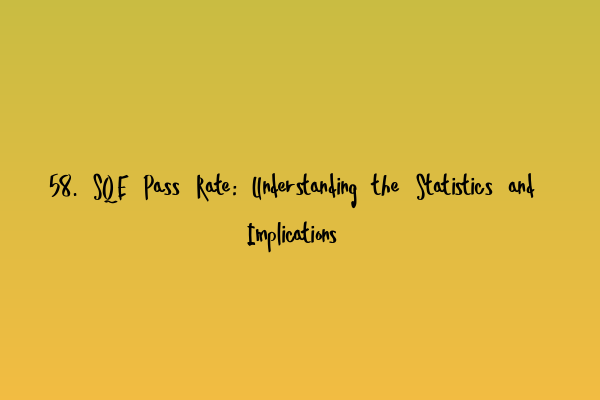58. SQE Pass Rate: Understanding the Statistics and Implications
Passing the Solicitors Qualifying Examination (SQE) is a crucial step towards becoming a qualified solicitor in England and Wales. As aspiring solicitors prepare for this challenging exam, it’s natural to wonder about the SQE pass rate and what it means for their chances of success. In this article, we will delve into the statistics and implications surrounding the SQE pass rate, shedding light on key factors to consider during your exam preparation.
The Importance of Understanding the SQE Pass Rate
Before we delve into the statistics, let’s understand why the SQE pass rate is so important to prospective solicitors. Firstly, it serves as a benchmark for measuring the difficulty level of the exam. If the pass rate is high, it may indicate that the exam is relatively easier, while a low pass rate could be a reflection of its difficulty.
Secondly, the pass rate can give you an idea of what to expect in terms of competition. A high pass rate may signify increased competition, making it crucial to prepare thoroughly. On the other hand, a low pass rate can provide some reassurance, knowing that fewer candidates are likely to clear the exam.
The Current SQE Pass Rate
As the SQE is a fairly new examination, the pass rate may vary as more candidates take the exam. However, according to recent data, the overall pass rate for the SQE stands at approximately 60%. While this may seem encouraging, it’s important to note that the pass rate can fluctuate depending on multiple factors, including the cohort of candidates and the difficulty of the exam itself.
Factors Influencing the SQE Pass Rate
Several factors can impact the SQE pass rate, making it imperative to understand them as you prepare for the exam. One of the most significant factors is the level of preparation you undertake. Effective preparation involves not only studying the necessary materials but also practicing with SQE 1 practice exam questions and taking SQE 1 practice mocks FLK1 FLK2 to familiarize yourself with the exam format and questions.
Furthermore, the quality of the SQE 1 and SQE 2 preparation courses you select can influence your chances of success. It’s essential to choose reputable courses that provide comprehensive coverage of the exam syllabus, guidance from experienced tutors, and access to relevant resources. Investing in a high-quality course can significantly improve your understanding of key topics and boost your confidence for the exam.
Implications of the SQE Pass Rate
Understanding the implications of the SQE pass rate can help you approach your exam preparation with a clear strategy. If the pass rate is high, it indicates that the exam is relatively easier, potentially leading to a more competitive job market as more solicitors qualify. In such cases, it becomes vital to distinguish yourself from other candidates by showcasing additional skills and experiences.
On the other hand, a low pass rate may signify a more challenging exam and a less competitive job market. While this may seem advantageous initially, it’s important to note that lower pass rates can also lead to fewer qualified solicitors, affecting the availability of legal services in the long run. Therefore, maintaining a balance between a challenging but fair exam and adequate access to legal services is crucial.
Conclusion
The SQE pass rate is a significant aspect of the examination process, providing insights into the exam’s difficulty level and competition. While the current pass rate stands at around 60%, it’s essential to understand that the rate can fluctuate based on various factors. By undertaking effective preparation, utilizing practice resources such as SQE 1 practice exam questions and SQE 1 practice mocks FLK1 FLK2, and choosing reputable preparation courses, you can maximize your chances of success.
Related Articles:
